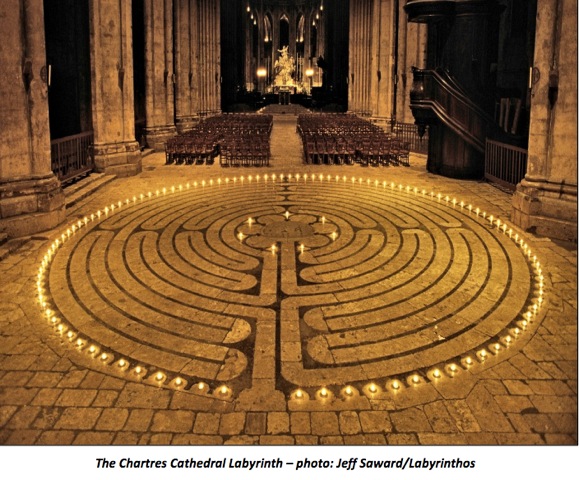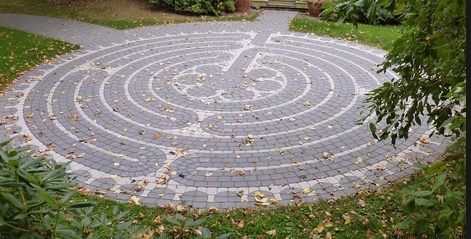AN ANCIENT AID FOR MODERN STRESSES
Help could be at hand for Guernsey people suffering stress or mental health issues, particularly as the result of the Pandemic. It comes in the form of a structure which taps into ancient wisdom dating back 4000 years.
The structure is called a Labyrinth, a winding pathway which users claim has an almost miraculous ability to combat stress in all its forms. Since the advent of Covid-19 its therapeutic ability to quieten the mind and create a sense of peace and serenity, has been re-discovered.
The practice of walking a Labyrinth is regarded as an exercise in self-healing and is now being used across the world in medical centres, schools, churches, prisons, memorial parks, spas, cathedrals and retreats. And now plans are in place to establish the Bailiwick’s first Labyrinth. Permission, in principle, has already been agreed by the Trustees of a notable Guernsey location to create one within its grounds which would be available, free, to the entire community. It would be a permanent construction of porous brick paviours and would be designed to last for generations.
What is a labyrinth? It is a single path winding towards a central point and then back along a different route to the exit. Its history can be traced back to around the time of the pyramids and, although not a religious artefact, the most famous Labyrinth is at Chartres Cathedral in France, which was laid down in about 1200, and which today attracts visitors from all over the world.
In modern times Labyrinths are seen as a physical, emotional and sensory experience used by people of all faiths, and none, to gain new insights and encourage personal reflection and serenity. A study by the London Health Sciences Centre showed that the use of Labyrinths resulted in increased focus and calm, along with a reduction in blood pressure and stress.
Helen Malcolm, senior lecturer in rural general practice at the University of Melbourne, Australia, uses a labyrinth with patients and staff members. ‘I get a variety of responses from patients,’ she said. ‘For some there is a sense of calmness, some come out feeling like singing, and some certainly emerge with a solution to a problem, or feeling stronger. For staff it is extremely good as a stress management tool, too.’
The Guernsey project, which has been estimated to cost up to £60,000, is being launched by the Guernsey Society of Dowsers, a registered charity, which is now seeking funding support. Said their President, Tony Talmage, ‘The magic of the Labyrinth is that it seems to hold a positive energy that appears to transform stress and anxiety into peace and calm. ‘
He said they were working with The Labyrinth Company, the UK’s foremost experts on Labyrinth construction, who would provide consultancy services and a detailed work plan. ‘Once the initial stage is complete we hope that local builders and pavers will be able to carry out the construction work under the experts’ guidance,’ he said.
Anyone who would like further information on the project is asked to contact Tony Talmage at 07911 719084. Or email: [email protected]
Pic 1 Chartres Cathedral Labyrinth.

Pic 2: A typical labyrinth

Labyrinth Q&A
What is a labyrinth?
Most people think a labyrinth is the same as a maze but they are complete opposites. A maze is a complex network of paths and hedges designed as a puzzle full of dead ends and false turns. While a labyrinth is one circular path on which you cannot possibly get lost. It winds its way to a central point and then back to the exit along a different path. Its history dates back to about the time of the pyramids and while it’s not a religious artifact the most famous labyrinth in the world is at Chartres Cathedral in France which draws visitors from all over the world.
What’s it for?
People walk it to get into a peaceful state of mind. And it’s now recognized as a tool for personal, spiritual and psychological transformation. In fact since the Pandemic its therapeutic ability to quieten the mind and create a sense of peace and serenity, has been re-discovered. The magic of the Labyrinth is that it seems to hold a positive energy that appears to transform stress and anxiety into peace and calm.
Where else in the world are there labyrinths?
They are everywhere and, because of their therapeutic benefit, they’ve been established in medical centres, schools, churches, prisons, memorial parks, spas, cathedrals and retreats.
Why do you want to establish one in Guernsey?
As far as I know there’s never been one in the Bailiwick and it seems to me that if it can help people in our community with stress or mental health issues we should go for it. Even if you haven’t got stress or mental health issues it’s also used as a way of relaxing and meditating so it’s open to everyone. Once it was built it would be available for literally generations to come.
How much is it going to cost?
That’s the challenge. To lay down a permanent structure made of brick paviours and then properly landscaped has been estimated at about £60,000 which sounds a lot of money but, if it lasts 100 years, and helps generations of people it will be cheap at the price.
Will it be built by local companies?
We expect so. Because building a labyrinth is such a specialist project we have engaged the UK’s foremost experts on labyrinths, Haywood Landscaping in Kent, who are acting as consultants. But, once the initial planning stages are complete we hope local craftsmen will do the work under Haywood’s guidance.
Where will it be?
We’ve reached agreement in principle with the Trustees of Les Cotils for it to be located in their grounds, which is the perfect fit for a spiritual/meditative walk available to everyone at any time.
Is there any actual proof that labyrinths help people ?
There have been many studies world-wide which have backed this up. For instance a study by the London Health Sciences Centre showed that the use of Labyrinths resulted in increased focus and calm, along with a reduction in blood pressure and stress. And a real-life testimonial I came across was a comment from a medical practitioner called Helen Malcolm, senior lecturer in rural general practice at the University of Melbourne, Australia, who said she uses a labyrinth with patients and staff members. ‘I get a variety of responses from patients,’ she said. ‘For some there is a sense of calmness, some come out feeling like singing, and some certainly emerge with a solution to a problem, or feeling stronger. For staff it is extremely good as a stress management tool, too.’
If anyone wants further information where can they get it from?
For a start from me, Tony Talmage, at this email address: [email protected] . Or ring me on 07911 729084
If you are interested generally there’s lots about labyrinths on YouTube. Just put ‘walking the labyrinth’ into the search field.
